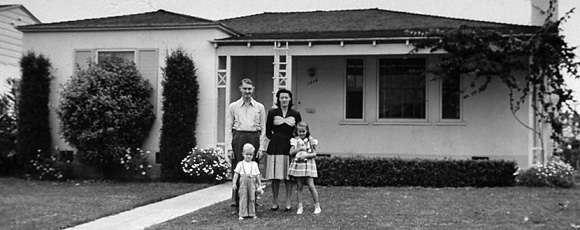
(3 of 4)
Dream and Reality
Yet there is a missing character in this popular version of the story of America's rugged individualism: the government, which helped make the rise of the individual possible. Americans have never liked acknowledging that what we now call the public sector has always been integral to making the private sector successful. Given the American Revolution's origins as a rebellion against taxation and distant authority, such skepticism is understandable, even if it's not well founded. As we have with race, we have long proved ourselves quite capable of living with this contradiction, using Hamiltonian means (centralized decisionmaking) while speaking in Jeffersonian rhetorical terms (that government is best which governs least).
The Pacific Railroad and Homestead acts, signed by Lincoln a century and a half ago this year, used the power of government to settle the West. The railway legislation gave federal support to the creation of a transcontinental railroad, a vast project that played a key role in making the U.S. an economic and cultural whole. Once the Golden Spike had joined the rails of east and west, the danger and duration of stagecoach rides gave way to the muscle and speed of locomotives — able to carry dreamers west, ship crops east and shrink the psychic distance of the continent.
The Homestead measures enabled settlers to claim small parcels of farmland west of the Mississippi, making new lives (and livelihoods) possible. The Morrill Act created land-grant universities, opening higher education to many throughout the country. The legislation of the Progressive Era brought a measure of humanity to the rigors of the industrial age and a democratization of power through women's suffrage and the direct election of Senators. The prosperity of the Roaring '20s proved short-lived, opening the way for the Age of Roosevelt and the New Deal.
Americans have been ambivalent about government since at least the time of George III, often approving its role when we benefit from it and disapproving when others seem to be getting something we aren't. The New Deal and particularly Social Security redefined the individual's relationship to the state, knitting the public and private sectors together much more closely. Long a more or less silent partner in people's lives, government became more evident as the U.S. struggled to survive the crisis of the 1930s.
We forget how extreme that crisis was for those who lived through it. Asked whether there had ever been anything like the Great Depression before, John Maynard Keynes replied, "Yes, it was called the Dark Ages, and it lasted 400 years." Democracy itself was in the dock, the American Dream a seemingly failed idea. Other dreams were now in play. The new age was up for grabs, it appeared, between the totalitarianism of Germany and Italy and that of Soviet communism. Roosevelt was said to have remarked that the two most dangerous men in America were Douglas MacArthur and Huey Long — possible dictators of the right and of the left.
Yet there was FDR, determined to preserve the world that Jefferson and Jackson had built and Lincoln had saved. The cataclysm of war lifted America to imperial status and set off an economic boom unrivaled in the history of the world. The war ended the Great Depression, but the work of the New Deal added a new dimension to the American Dream: the broad expectation that government had a role to play in advancing individual lives.
After the defeat of Hitler and of imperial Japan, the Dream was rekindled. Through the GI Bill and home loans and deductions for mortgage interest, as well as interstate rail and highways and Cold War defense spending, more Americans entered the middle class than ever before.
Even those long excluded from it. It is striking that the symbolic high-water mark of the civil rights movement was framed in terms of the American Dream. When Martin Luther King Jr. rose to address the March on Washington in August 1963, he described his dream of an integrated America as "deeply rooted in the American Dream." He was asking only for black Americans' rightful share of the life that most white Americans had come to take for granted: a life in which whites were judged by "the content of their character."